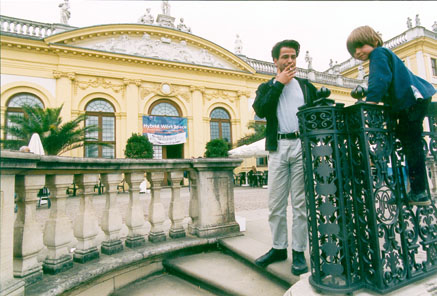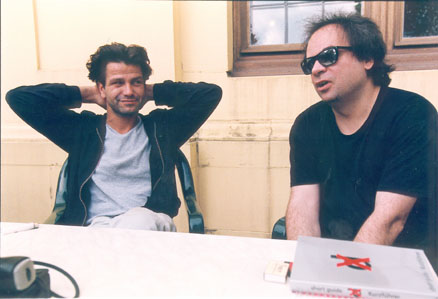
| Recorded in Kassel on the 4th of July, 1997 | [kassel] |

|
français / english |
Florian Schneider is a member of n.s.i.a.m.p., which is a small group of activists, artists, filmmakers, fotographers from Germany and abroad. They have organised [cross the border] at the Hybrid WorkSpace of the Documenta X in Kassel. Their central political struggle is to support migrants and refugees, documented or undocumented, in their fights for the right to live, where they like and how they like. Among them one should also mention Gisela Seidler who is the lawyer, Jochen Kraus who is the video-maniac, Christiane Suppan too, Ralf Homann who does great radio programs, Marily Stroux who is the fotografer and from Hamburg, and many many other people, from Kassel, from Frankfurt, and Berlin and so on. A german wide conference of antiracist groups was organized in Kassel and started a campaign "no one is illegal". The main result after the ten days is that about 1.000 people and groups have signed their appeal. This interview was conducted in Kassel, where many persons from the French sans-papiers movement came to support them, and specially members of the 'pajol' Web team, the Web site of the sans-papiers.

Florian Schneider: We came together at the end of the last year, and we decided to form a new group. Most of us were friends for a long time. Some of us knew each others from the anti-nuclear movement, some of us worked for a long time together with refugees, some are physicians, lawyers, but also artists and journalists. We wanted to start afresh antiracist politics. This is meant in a concrete and direct way, because we are not interested at all in any representative politics. From the very beginning we worked close together with groups who are active since 8 or 10 years. The idea was to bring together our special skills, but also to mix long expierences in political struggles with the optimism of newcomers.
Yes, definitely, it's related. We came together in the end of autumn last year, and the actual reason for it was what happened in August in Paris. We were not very well informed by the press and the mass media. So we decided "let's check it out by our own!". All of us felt that the struggle of the sans-papiers represents a completely new quality. Our first aim was to establish a connection to Paris. And then we decided "ok, we have to spread this information". We organized a meeting in the end of April in Munich and invited very different people: one from Berlin, from a research center for flight and migration, was talking about the situation in the Eastern Europe countries, the special situation of refugees, who want to enter Europe or Germany. They have to cross Polland, Tchekia, Slovakia, Hungary, Ukrainia... Another speaker presented "Aktion Zuflucht" - that means that people declare publically that they gonna hide refugees and especially so called illegal persons. We made two contributiuons by our own, one more on a theoretical or general level, the other about how important it is these days to combat the regime of borderlines in a very concrete way. And we invited also a spokesman from the sans-papiers movement, refering about the history of the struggle and the actual situation of the sans-papiers in France. The meeting was a big success, not only because of the fact that quite a lot of people participated, but also because of the diversity of the content and a certain resoluteness. Me personally, I was very impressed by the atmosphere. Imagine, it was about four hours lectures and only very short discussions.
Since this half a year, we build up all our contacts to people in Paris and to people in France mainly via Internet; this is a new experience for us. Some of us use e-mail and Internet privately or because of their professions. And now we used it for the first time for political work. And especially because of the political background it's quite strange to get in contact with people you have never seen before, and maybe you won't see them for some weeks, or for some months, and it's also a great surprise and a big pleasure to meet them after all :) Since the beginning of december, as soon as we subscribed to the 'zpajol' mailing list, we felt something like a part of the movement, because we just felt extremely very well informed, by everything which was going on, the increase of the protest against the lois Debré, and also about the struggle of the sans-papiers and people in general, the theoretical and practical background. So it was a chance for us, not to get only one single and of course very subjective point of view, but informations from different groups. So it's much easier to get a general view and to realize the complexity and diversity of the movement, and how much full of life it is. We heard about the sans-papiers struggle by the mass media, but it was mainly very ugly agitation against migrants.
I spent some days in Amsterdam two weeks ago, because of the Euro Summit and I made there some very interesting experiences. All the demonstrations and all the actions against the Euro Summit have been immediately reported to the Internet Community. Some people made big efforts on netcasting the protest all over the world, they experimented with real video, real audio, but they gave also daily e-mail reports. It seems to be a big chance in the future, because the medium is quite cheap and there's no censureship by state authorities, by the press agencies, or by the journalists. And everybody has the possibility to be a sender, or even a television station, and a receiver of information and action at the same time. And I mean, the new technologies will change a lot, this is quite obvious. And we have to check out how we can use these new technologies, not only for publishing electronic flyers instead of printing them on paper, but much more for a new type of political actions and communication; we have to put the promises on the proof and we have also to brush the big hype and the polished style against the line and we'll see what happens. What we don't want is to spoil our time in a technical playground, or only for stupid and commercial entertainment.
Yes, sure, we are also a little bit surprised. On one hand we obviously have a fools licensse here, we can declare everything, we can also nearly practice everything. On sunday, we opened a passport exchange office, and we asked people to give us their passport to pass it on people who need it much more, which are undocumented or so called illegal people. A policeman appeared, and he asked "is this art or not? what are you going to do with the passports?" And we asked him for his mark or his passport. He refused to give us his passport, but he promised us to talk with his superiors about the action, and that was what we wanted to reach. So it seems that we could do everything we want. It's great and very funny, but in the same way, it makes me nervous a little bit, because there is even no reaction by the other side. That's the main problem in the art context. We decided to use the possibility to make politics here because it's very important at this moment to spread the campaign we started, and to spread the aims we have, spread them very widely. That's the reason why we are here. I mean there are a lot of actions we normally have prefered, real or direct actions, not so virtual actions like here. In France, I recall the film festival in Cannes, and the presence of the sans-papiers and their supporters there. They were not officially invited like us, but they used it also for their aims. I propose not to make a difference between the fact that you are allowed to do something, or that you are not, by the authorities. As soon as we decided we wanted to go to the public for any action, we suggested to do it, because it's a good action, and because it's usefull; and not to think about "are we involved in an institution or not?" We decided that we want to say something, and we have to say it right now. And we use any possibility to say it.
We started very carefully, because a lot of the groups who met on last saturday, they have been working on this subject since ten years, some since twelve years. And they are really tired of starting every year a new campaign. So we said ok, let's start this campaign and let's use the Documenta X for ten days and then we will see, if it works or not. And then we go on decentralized. There's no central office, no central organisation, and no call for a central demonstration or simultaneous actions in all cities on the same day. Every group which supports the appeal is responsable for the forecoming of the campaign and every group will decide by its own what is the best way. But we also plan to publish the appeal "no one is illegal" in different newspapers, and it's up to every group in every city to collect the local subcribers and to collect the money for publishing the call in their newspapers. We try something new and we really try not to overorganize, because we don't want to set up a new party or NGO. It's something like a grassroot campaign and the main idea is networking and connecting all the different aspects and activities of the antiracist movement. But at the same time, there is a big needing for communication which has to reach everybody. And we try to use the possibilities of Internet, and especially e-mail and newsgroups. We want to use it for a permanent discussion and for information of all groups about the latest state of the campaign.
